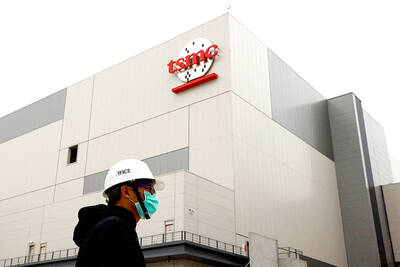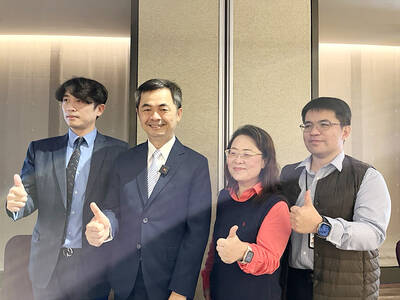The Ministry of Economic Affairs on Friday approved nine small and medium-sized enterprises (SMEs) to participate in its Invest in Taiwan initiative, with the companies pledging to spend a combined NT$3.6 billion (US$121.6 million) to construct new plants and add automated production lines.
The nine companies include an industrial waste recycler, a custom furniture manufacturer, an automaker and an egg producer, the ministry said.
Since last year, it has given 286 SMEs approval to take part in the Small and Medium Enterprise Acceleration Program, it said, adding that investments totaling NT$118.3 billion have been pledged, and more than 11,389 local jobs would be created.
Among the latest investments approved, industrial waste recycler Yung Yuan Chemical Materials Corp (永源化工) plans to spend NT$400 million on building new factories with smart management technology in Taoyuan’s Dayuan Industrial Park (大園工業區), the ministry said in a statement.
Yung Yuan processes one-third of the heavy metal sludge in Taiwan, turning industrial waste into products such as copper powder that can be used for 3D printing, among other applications, the ministry said.
Egg producer Rui Fu Foods Co Ltd (瑞福食品) would be spending NT$300 million to build an advanced egg processing plant in Tainan’s Guantian District (官田), the ministry said, adding that it aims to improve speed and quality, as well as address food safety concerns.
Other projects would also expand production capacity and improve quality, said Ho Kun-sung (何坤松), chief operating officer and spokesman for the ministry’s InvesTaiwan Service Center.
The ministry’s program attracts companies by subsidizing bank processing fees, Ho said.
“They still have to negotiate with banks themselves, but program participants can usually push the interest rate down from 1.5 to 1.9 percent to less than 1 percent,” he said.
There are three programs under the Invest in Taiwan initiative. In addition to the Small and Medium Enterprise Acceleration Program, there is the Welcome Home program aimed at encouraging Taiwanese companies to bring production back home from abroad, and the Roots in Taiwan Program, which helps larger businesses expand capacity in Taiwan.
To be eligible for the programs companies must propose projects that raise their quality of production and create new jobs in Taiwan, the ministry said.
The ministry on Thursday approved two companies for the Roots in Taiwan program: LED and laser diode testing company Fittech Co Ltd (惠特科技) and aluminum parts maker Gutson Die Casting Co Ltd (煜益鋁業).
Fittech plans to invest NT$5.2 billion building a smart production base and operational headquarters at the Taichung Industrial Park (台中工業區), and expand its cleanroom facilities at Taichung Precision Machinery Science and Technology Innovation Park (台中精密機械園區), the ministry said.
Gutson Die plans to invest NT$300 million in a new smart factory at Taichung Port’s Kuang Lien Industrial Park (台中港關連工業區), the ministry added.
The three investment programs under the Invest in Taiwan initiative have so far brought in NT$1.05 trillion in investment pledges from 556 firms, creating 87,298 job opportunities, while 52 applications are still waiting to be reviewed, the ministry said.

Stephen Garrett, a 27-year-old graduate student, always thought he would study in China, but first the country’s restrictive COVID-19 policies made it nearly impossible and now he has other concerns. The cost is one deterrent, but Garrett is more worried about restrictions on academic freedom and the personal risk of being stranded in China. He is not alone. Only about 700 American students are studying at Chinese universities, down from a peak of nearly 25,000 a decade ago, while there are nearly 300,000 Chinese students at US schools. Some young Americans are discouraged from investing their time in China by what they see

Taiwan Semiconductor Manufacturing Co (TSMC, 台積電), the world’s largest contract chipmaker, yesterday reported record sales for the first quarter, which analysts attributed to solid demand for emerging technologies. Consolidated revenue totaled NT$592.64 billion (US$18.51 billion) in the January-to-March period, up 16.5 percent from a year earlier, but down 5.26 percent from the previous quarter, TSMC said in a statement. The first-quarter revenue beat analysts’ average projection of NT$579.5 billion, Bloomberg News reported. That performance lends weight to expectations that the world’s most valuable chipmaker would return to solid growth this year after weathering a post-COVID-19-pandemic cratering of smartphone and computer sales. TSMC is budgeting

US CONSCULTANT: The US Department of Commerce’s Ursula Burns is a rarely seen US government consultant to be put forward to sit on the board, nominated as an independent director Taiwan Semiconductor Manufacturing Co (TSMC, 台積電), the world’s largest contract chipmaker, yesterday nominated 10 candidates for its new board of directors, including Ursula Burns from the US Department of Commerce. It is rare that TSMC has nominated a US government consultant to sit on its board. Burns was nominated as one of seven independent directors. She is vice chair of the department’s Advisory Council on Supply Chain Competitiveness. Burns is to stand for election at TSMC’s annual shareholders’ meeting on June 4 along with the rest of the candidates. TSMC chairman Mark Liu (劉德音) was not on the list after in December last

FIRST FORAY: The maker of EUV pods said it plans to begin the construction of the plant later this year, with mass production expected to start next year Gudeng Precision Industrial Co (家登精密), the sole extreme ultraviolet (EUV) pod supplier to Taiwan Semiconductor Manufacturing Co (TSMC, 台積電), plans to build a plant in Japan in an effort to help customers boost supply chain resiliency, it said yesterday. The NT$500 million (US$15.52 million) investment is a response to requests by key customers to build capacity outside Taiwan and China amid escalating geopolitical tensions, it said. The plant would be built in Fukuoka Prefecture’s Kurume, which is about a one-hour drive from TSMC’s fab in Kumamoto Prefecture’s Kikuyo, Gudeng said. Gudeng plans to begin the construction of its first overseas plant later this